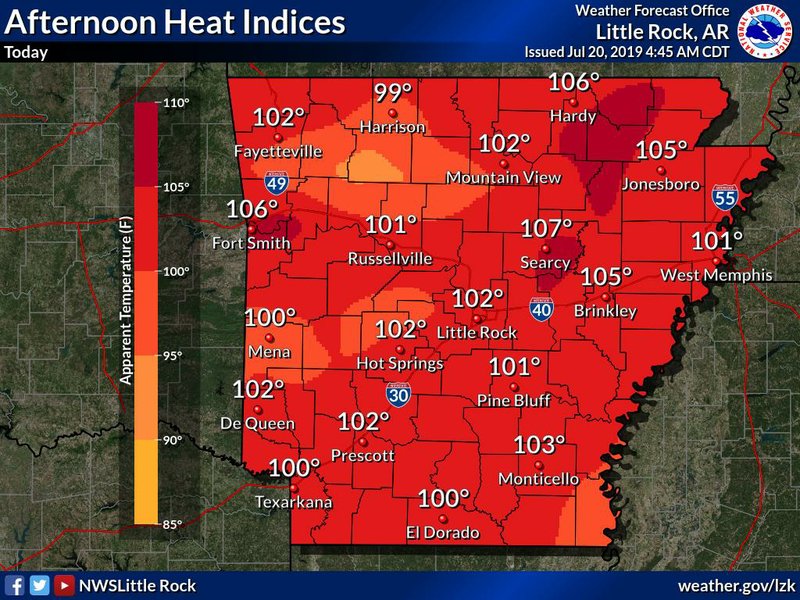It's hot enough to melt a tube of lip balm, hot enough to transform a pack of gum into a sticky mess, hot enough to make you sick and hot enough to kill you.
The National Weather Service issued a heat advisory for Friday and today for much of Arkansas as the heat index surpassed 100 degrees in much of the state. The heat index is a measure of how hot it feels when relative humidity is factored into the air temperature, the weather service says.
A heat wave swept much of the country this week -- spreading from New England to the central U.S. and the South, according to the weather service. Temperatures are expected to be 90 degrees or higher throughout much of those areas.
"Heatstroke, heat exhaustion and other heat-related illnesses will be possible, especially if you spend a significant amount of time outdoors, or are involved in any strenuous outdoor activity," the National Weather Service said.
"The cumulative impacts of heat on the human body can be significant when consecutive days of excessive heat occur."
"This is a public health concern," said Dr. Gary Wheeler, the Arkansas Department of Health chief medical officer.
Former University of Arkansas and National Football League fullback and offensive guard Mitch Petrus, 32, died Thursday night from a heatstroke after working all day outside and in his family's shop.
[Video not showing up above? Click here to watch » https://www.youtube.com/watch?v=8A1FhjFQXEc
From 1999 to 2017, 166 Arkansans died from exposure to extreme heat, according to federal mortality data. Nationally, 7,502 have died from heat-related illnesses.
Wheeler said his department is studying the effects of climate on public health. Researchers monitor extreme heat, as well as flooding and tornadoes.
Every year, the department puts out information on heatstroke to prevent illness and death.
Among the first warning signs of overheating are cramps and fatigue, he said. The next series of conditions include dizziness, headaches and fainting.
If these symptoms continue for an hour or progress to include confusion and throwing up, people should seek immediate medical attention, Wheeler said.
"When you get to this point, because you're not thinking clearly, you're really dependent on the people around you," he said.
Dr. Michael Israel, the sports medicine director at Arkansas Children's Hospital, said that at this time of year, caring for children who are practicing or playing outdoor sports is particularly important.

"July and August are the most concerning months," Israel said. "There's higher temperature, higher humidity, but also just because this is when our [student] athletes tend to come back."
Usually, sports practice begins in the middle of July after a two-week "dead period" when kids aren't allowed to practice, Israel said.
Coaches are required to have education about heat illnesses and watch for signs such as lethargy and vision impairments in student athletes. But there are things parents can do to help, he added.
"The biggest thing we always emphasize for our patients is acclimation," Israel said. "Kids that are sitting inside all summer, they're going to struggle if they go outside all of a sudden with exertion."
Smaller children who don't play sports are also at risk of injury because of the heat. From 2012-17, at least six deaths in Arkansas occurred when kids were locked in hot cars during the summer months, according to a database created by the Arkansas Democrat-Gazette.
Arkansas has one of the highest per capita rates of hot car deaths, according to data from 1998 to 2018 gathered by Jan Null, who studies hot car deaths and operates the website noheatstroke.org.
Even if the weather is cooler, children left in cars can overheat, he said. He recommended that parents keep their cars locked and their keys away from their children so the youths don't get in the vehicles by themselves. Parents should also make plans with day care or preschool workers to call if the child isn't dropped off close to the set time to ensure that the child wasn't forgotten in a car.
In addition to heatstroke, he's read cases of kids putting the car into gear and crashing, someone stealing the car with kids in it and children strangling themselves on power windows.
"There are no good reasons to leave your child unattended in the car," Null said. "Those things can happen in seconds. We're not talking minutes."
A Section on 07/20/2019
